I keep running into people, many of whom have finally discovered, possibly after years of experiments, what makes them feel really good, diet-wise. They are, naturally, excited. They want to shout it from the rooftops. They often read everything they can get their hands on about their new diet and all of the information that supports it.
But then we have a little problem: people who go around the internet and tell people how they are eating wrong, and if they would just stop eating this or that, or start eating this or that, they would improve their health so much.
Responses from Person B that they do just fine eating this or that are met with scorn and derision. “You just think you’re okay because you’re addicted to it. But it’s damaging your body. It’s bad for everyone! If you would only read (insert Book C), you would understand.”
Stop doing that.
Look, there are proponents of every diet who believe that it’s the “right” one. Who believe that everyone is being damaged when they consume particular foods. Who write books that cherry-pick data to prove their case. And there are followers of those books and “experts” who believe what they say and try to convince everyone else that they really need to stop eating certain foods because the book said so.
There’s really, truly, no one “right” diet.
It’s Vegetarian! No, Vegan! No, Paleo! No….
This is not limited to one group of people. There are people out there who believe:
- All meat is poison and will cause heart disease and make you fat and stupid
- All dairy is poison and will cause heart disease and make you fat and stupid
- All sugar is poison and will cause heart disease and make you fat and stupid
- All fat is basically poison…
- All legumes are basically poison…
- All nuts are basically poison…
- All grains are basically poison…
- All fruit is basically poison…
Well, gee, what’s left at that point? Leafy greens? Be careful about those, some of them are high in oxalates! Oh…I guess we can’t eat anymore.
There’s someone who thinks every food or food group is bad for you. If you listen to all of them, you will go insane. There will be nothing left to eat. And eating shouldn’t be that frustrating. Who needs that kind of stress?
I know this all came with good intentions. When you find what works for you then you want to share. And maybe someone will learn something! That’s great, if so. We should share information, so that people know “If you have these symptoms, you may benefit from eating or not eating these particular foods” and then let them decide if they want to try that out for themselves. Maybe it will be beneficial for them. Maybe not. As long as it’s said with grace and an understanding that they’re a unique individual, it’s a good thing.
Holier-Than-Thou Eating
But so many people do not share this information just to inform others. They laugh about it. They’re condescending. “Oh, you just don’t know.” They ignore peoples’ defenses and chalk it up to “the meat talking” and “the grains talking” (or whatever) and believe if they would just listen and stop being sheeple, they would feel so much better.
The smugness and the condescending superiority — that’s what gets to me.
Just don’t do it, people. Don’t ever assume that your way is “the” way. Don’t state for a fact that no one should ever eat gluten because it’s poisoning us. And you know because that one book said so. Don’t mock people who don’t believe you or who have conflicting evidence — either researched or from personal experience.
If you’re trying to share information, this is the wrong way to do it, anyway. Advocacy must be gentle and respectful. Advocacy says “Did you know…” or “Have you considered…” It allows people a chance to think about the subject in a non-threatening manner, and it gives them a chance to ask questions and discuss the issue. It leaves room for them to say, “Thanks, but that’s not right for me.” Without being shamed. Without being told they just don’t get it.
As soon as you’re rude, no one is going to listen to you. They are going to roll their eyes at you, argue with you, feel more firmly set in what they already believed. You aren’t helping anyone when you’re holier-than-thou. You’re preaching to the choir, and that’s all you’re doing.
People Are Individuals with Individual Needs
This is important, so listen carefully: everyone is different. There is no ideal diet that is right for everyone.
Yes, gluten is bad for some people, whether they have celiac or an intolerance. And those people should avoid gluten. This does not mean that all people need to avoid gluten.
Yes, dairy is bad for some people, whether they are allergic or lactose intolerant. They should avoid dairy. This does not mean that all people need to avoid dairy.
I could go on. I won’t. The point is, we are biochemically individuals. We should eat real food, in whole, unprocessed form, and we should avoid chemical processed foods. That’s pretty universal. (But I’m not going to shame anyone who eats those things sometimes. We all eat things that aren’t the healthiest for us, sometimes. Better to eat the occasional treat or bit of junk stress-free than lose your mind because you “cheated.”)
Beyond that, you’ll find people who do better on or off various different foods.
We know a friend whose child was struggling with severe allergies and some behavior issues. She tried GAPS, lots of fermented foods, etc. Her daughter got worse and worse. She went off GAPS, cut the fermented foods, and experimented until she found what worked for them. It’s not what “healthy” looks like for our family, but it absolutely works for them.
We have other friends who are vegetarian or vegan and who are healthier that way.
We personally found we do better with soaked or soured whole wheat than gluten-free grains like rice, corn, or quinoa.
This is something that you need to experiment with. Forget the latest articles that came out saying you have to eat chia seeds or that nut flours are killing you. Choose the foods that make you feel healthy and strong, and avoid the ones that make you feel unwell. It really is that simple.
And if anyone comes up to you and says “You know that’s terrible for you and you should never eat it again,” picture yourself smacking them, then say, “But I enjoy it so much,” smile, and walk away. Who cares what they think? If they can’t find any better way to broach the topic than that, they’re not worth listening to.
How do you feel about a healthy diet — is there a “right” answer?
SaveSave

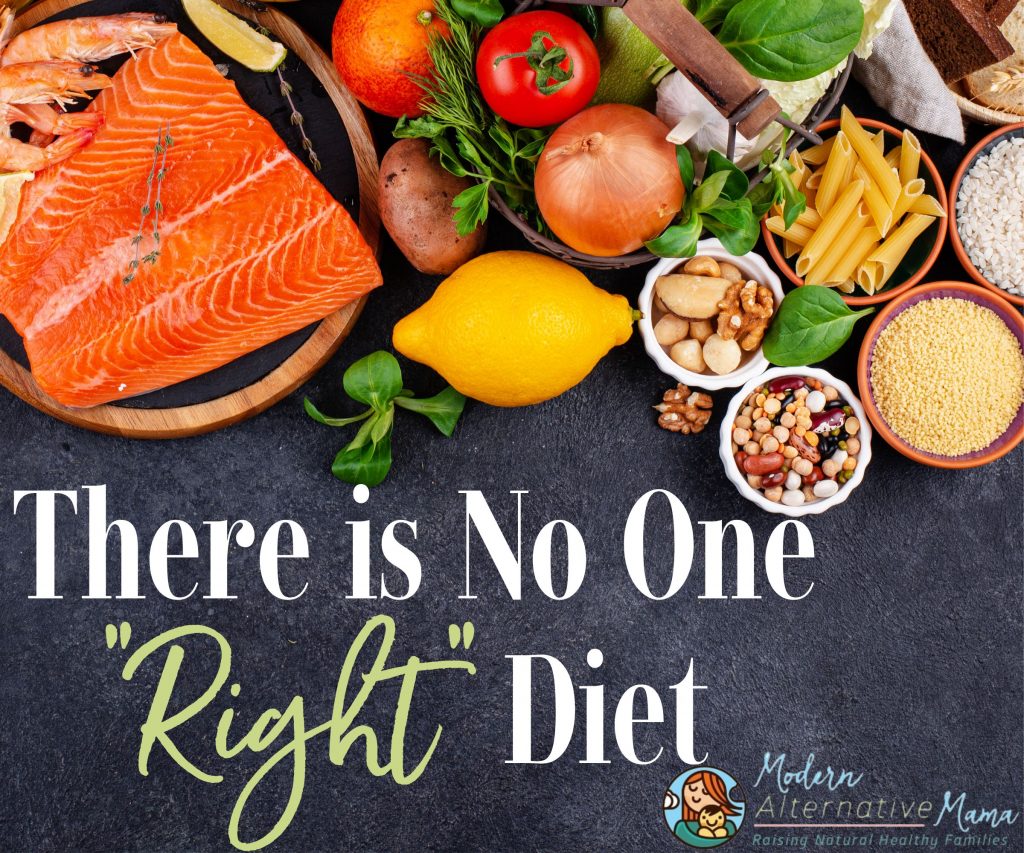
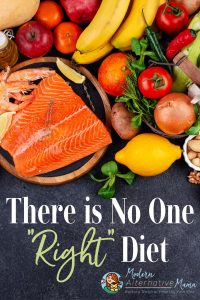
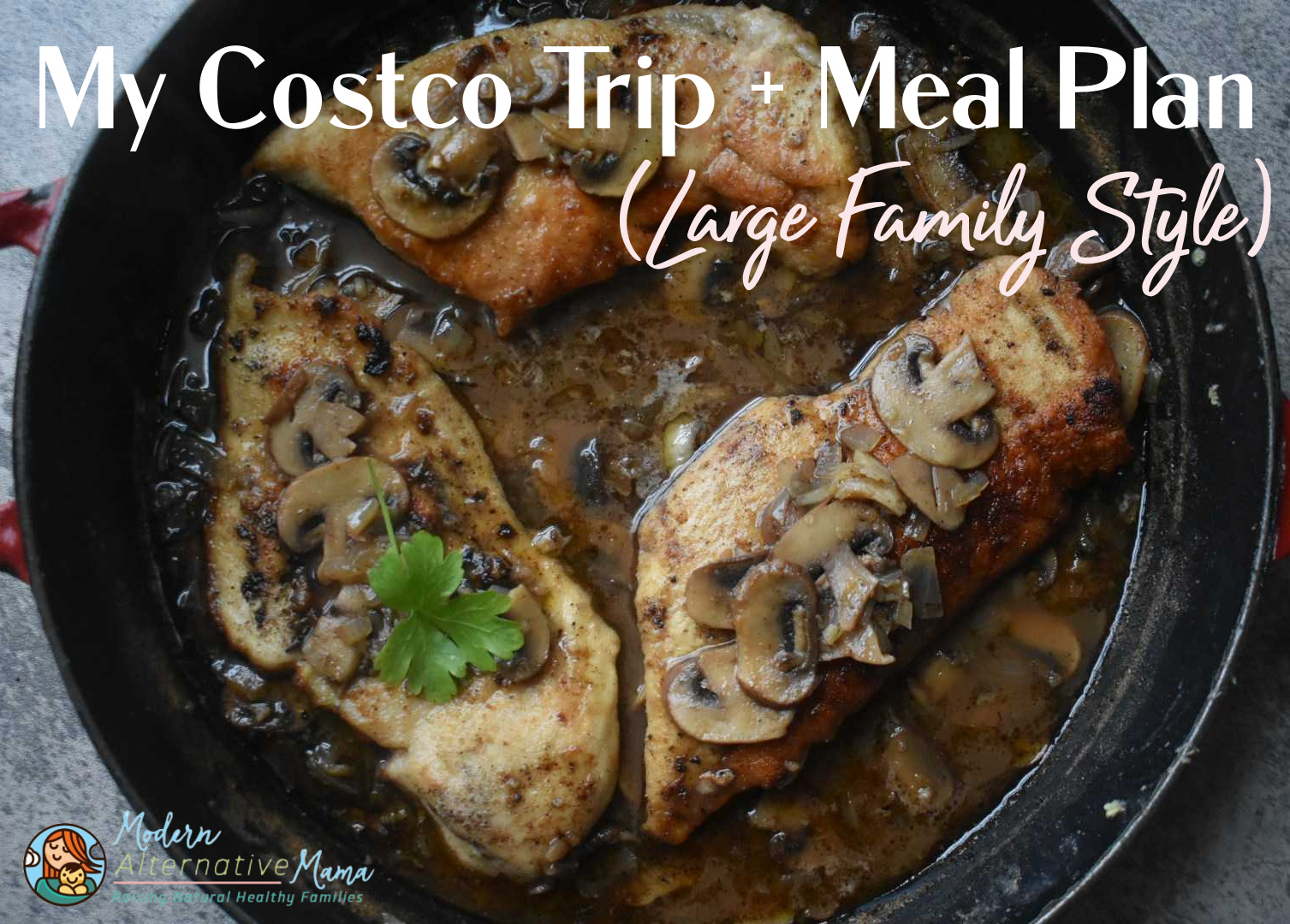
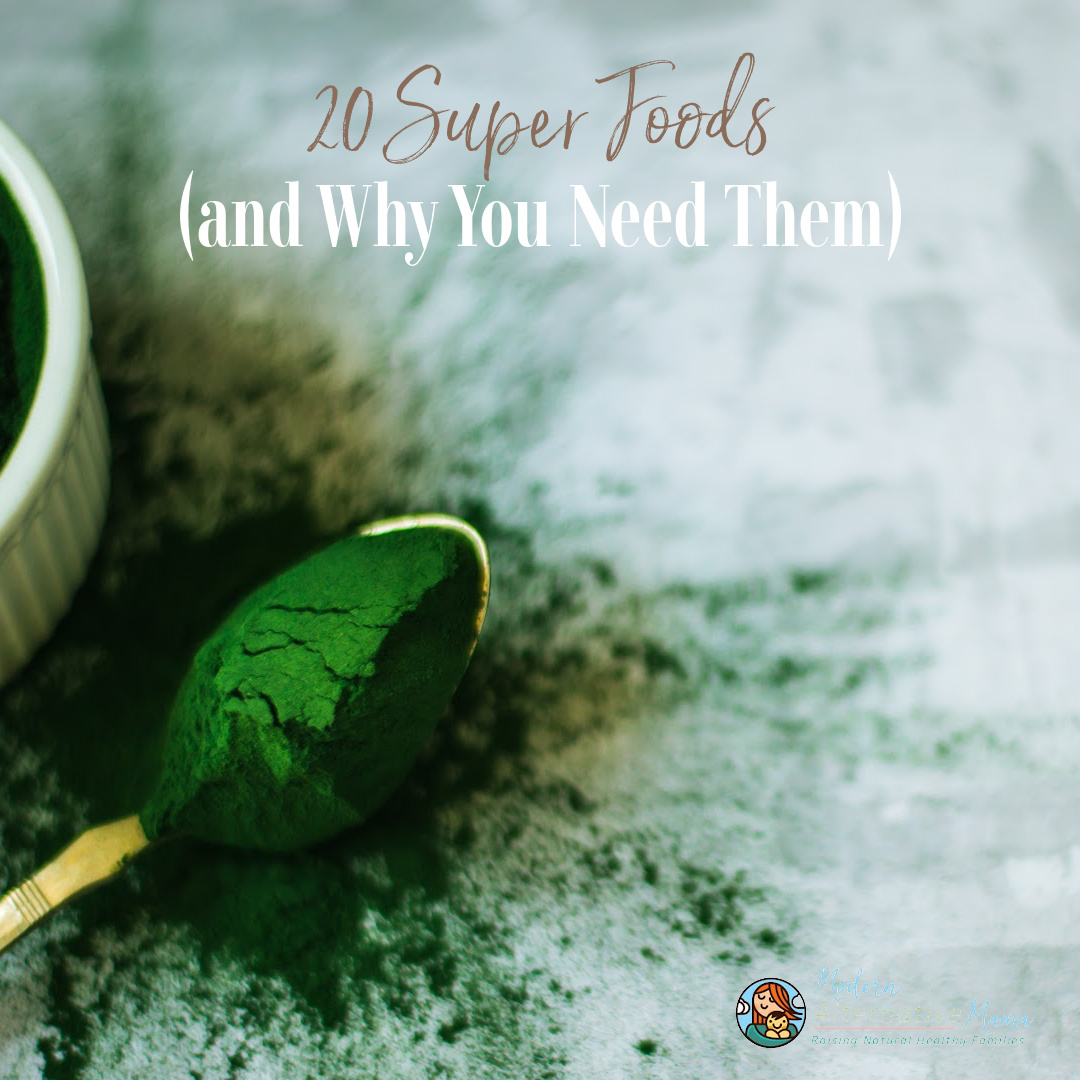
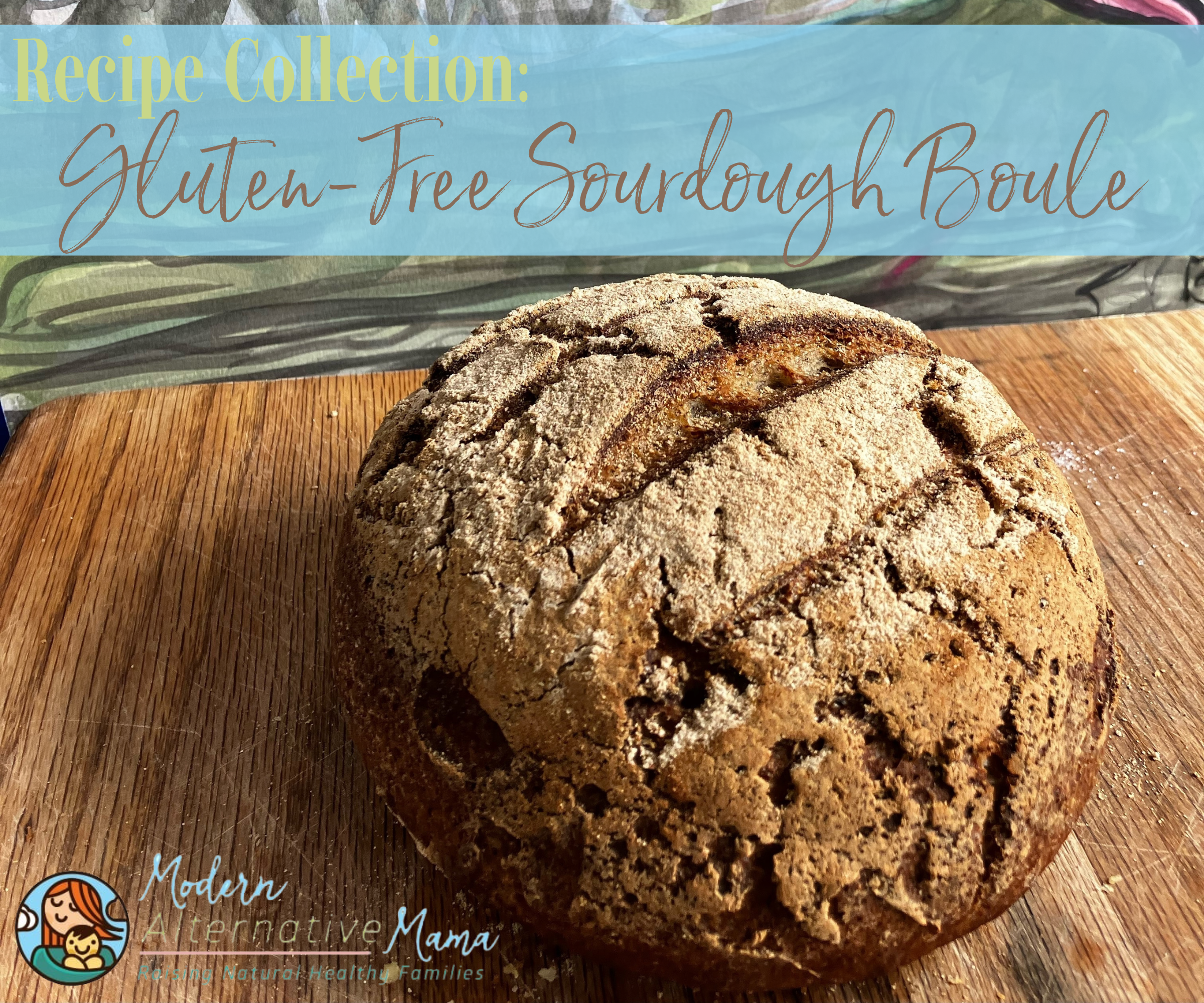
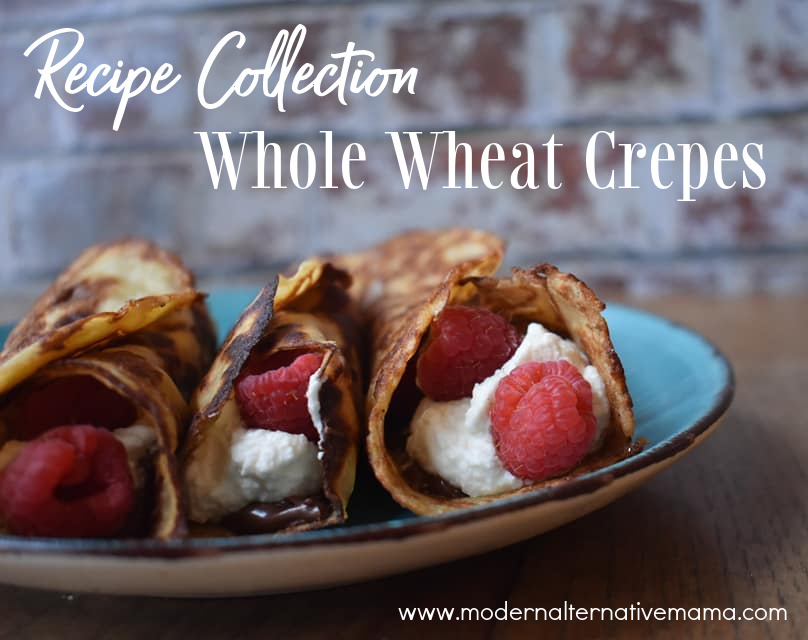

Thank you for that article! I’m a vegetarian because I have trouble digesting meat/animal protein (some months vegan depending on our grocery budget and what small town walmart has to offer) and also have kidney stones which means high oxalates are out to get me. I’ve spent hours researching diets and have become exhausted sorting through opinions and research that argues with each other . We put ourselves in stressful healthy-diet boxes. “I’m vegan I can’t eat that. Those people expect me not to eat that.” Instead of a label why can’t I just be me and eat healthy and if I want cheese one week and don’t want it the other who cares. If I didn’t eat sugar all week but decide to have a bowl of icecream while I watch prime-time tv I shouldn’t feel like I’m letting a diet/people down.
I totally agree. My sister is a pescitarian and I am a mostly primal eater. But I didn’t get this way overnight. The thing that I did – a Whole30 – is all about figuring out what way of eating works best for you. You cut out several groups of food items (added sugar, grains, legumes, dairy, alcohol) that have been scientifically linked to increasing inflammation in most people for 30 days, then you add them back in. The idea is to find what your body doesn’t do well with (for me, I found out I had Celiac through it) and then you can make informed decisions about what you do eat.
The nice thing about making it about your experiment is that you can really figure out how YOUR body does. It’s not someone else saying “you have to eat this one food or you’ll die of cancer as a fat stupid person” – it’s you learning what foods do to your body. It also helps a lot of people with eczema, psoriasis, IBS, Crohn’s, fibromyalgia…you name it, they’ve pretty much had at least one person with that disorder/disease have benefits from determining what foods trigger their symptoms. And that’s really cool – plus, like for me, issues I didn’t actually realize I’d had were suddenly gone and I saw what I had been missing. The brain fog I get from eating too many grains was gone, although I do allow some (gluten free) grains when I’m not on a Whole 30. If I eat too many of them, I can see myself being unable to focus on as many tasks at work and will stop eating them…within 24 hours I’m clear again. There are plenty of people out there who do fine on grains and I don’t try to force them to eat like me, although if they eat at my house they won’t get many of them.
I think this post is spot on. Eat what makes YOU feel good. Be open minded and consider experimenting to see if something might be bothering you that you didn’t realize. But, once you find that balance that works for you, ignore everyone who’s trying to sell you something. And, above all, eat mostly real food.
Amen! I just ignore it and smile politely when someone tells me that they’ve found the perfect diet and I should immediately drop whatever I’m eating and jump on the bandwagon. My family feels best on small amounts of well-raised meat, lots of fresh veggies, fruit, dairy and whole grains. We eat as unprocessed as possible, not because we’re snobs, but because we feel yucky when we eat a lot of processed foods. We eat gluten, lactose, grains of every kind and feel great. No, not because we’re addicted and don’t know any different. Honestly, when I don’t eat grain (or other carbs), I don’t have much energy and feel hungry and lightheaded. But I know many people who’ve cut milk or grain or meat out of their diets and feel fabulous. I think that’s fantastic. We also eat small amounts of refined sugar. It doesn’t affect us negatively and we feel just fine. However, if we overdo it, we all feel awful and my 5 year old’s behavior is negatively impacted. So, we opt for natural sweeteners when possible. It’s all about what works for you. Great post.
A-men! I get so sick of other people telling others what they should and shouldn’t eat! My GI system does not tolerate veggies very well. I don’t really like most veggies. Life does not allow time to spend hours in the bathroom every day. We eat a lot of meat and dairy. I have been criticized and scolded, but it works for us. I have successfully gotten my pre-diabetic level blood sugars under control (normal A1C for the past 8 months 🙂 thanks to increased protein and animal fats. As an added benefit, I have started to drop some weight. The amount of protein from other sources wasn’t enough no matter how few carbs I ate. Now I can comfortably eat more healthy carbs (fruits, whole grains, and my daily latte with a shot of syrup) and know that it is OK. The only bad part about more meat, dairy, and fresh produce is the added cost. We can’t afford most organic items or grass fed meats. If I lived somewhere else it might be more affordable. But then my income might be lower too. To keep my sanity, I use a 75/25 rule that allows me to cut costs on other items even though they may contain some “undesirable ingredients”.
You get an Amen from me, too. I read a book a few years ago, I think it is call the Tao of Eating. The gist of the book is to pay attention to your body when you eat. If it helps you or you tolerate it just fine, eat it again, if not then don’t. I have tried to do that and my annual strep throat stopped occurring, fewer colds, get over bugs I do get faster. We eat meat and dairy (we have dairy goats), like our homemade bread and try to get in 2 types of veggies in each meal. Eat as little processed food as we can get by with.